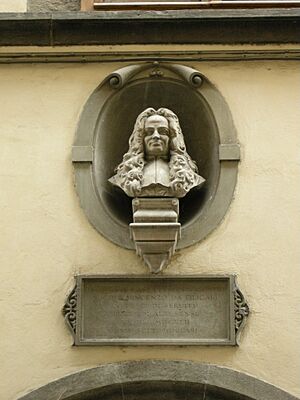Vincenzo da Filicaja facts for kids
Quick facts for kids
Vincenzo da Filicaja
|
|
|---|---|

Vincenzo da Filicaja
|
|
| Born | 30 December 1642 |
| Died | 24 September 1707 (aged 64) |
| Resting place | Santa Croce, Florence |
| Other names | Polibo Emonio |
| Alma mater | University of Pisa |
| Occupation |
|
| Spouse(s) |
Anna Capponi
(m. 1673) |
| Children | 3 |
| Parent(s) | Braccio da Filicaja Caterina di Cristofano Spini |
| Writing career | |
| Language | Italian, Latin |
| Signature | |
 |
|
Vincenzo da Filicaja (born December 30, 1642 – died September 24, 1707) was a famous Italian poet and politician. He lived in the Grand Duchy of Tuscany, which was a state in Italy a long time ago. People often compared his poems to those of Petrarch, another very famous Italian poet.
Vincenzo was part of the Accademia della Crusca, a group that worked to keep the Italian language pure. This connection helped him get support from important people, including royalty. He worked as a governor in cities like Volterra and Pisa. Later, he became a member of the Tuscan Senate, which was like a government council.
Vincenzo's Life Story
Vincenzo da Filicaja was born in Florence. His family was well-known and important. His parents were comfortable financially, which meant Vincenzo could get a great education.
He first studied with the Jesuits in Florence. Then, he went to the University of Pisa to study law. After five years in Pisa, he returned to Florence.
In Florence, he married Anna Capponi. She was the daughter of an important senator. Vincenzo then moved to a small country home called "Al Filicaja." He spent his time there writing Italian and Latin poetry.
He became a member of the famous Accademia della Crusca. This group was very important for Italian literature. Through this academy, he became friends with other writers like Francesco Redi. Redi helped Vincenzo get noticed by powerful people in the government and royal courts.
Vincenzo's family didn't have a lot of money, which is why he lived in the countryside. But his writing career took off after a big event. In 1683, the city of Vienna was saved from an attack by the Turks. This event inspired Vincenzo to write powerful poems.
His friend Redi showed these poems to his own ruler. Redi also made sure the poems reached the foreign princes who were praised in them. The first reward for his poetry came from Christina, the former queen of Sweden. She offered to pay for the education of Vincenzo's two sons. She even asked him to keep it a secret, which showed her kindness.
Vincenzo's life got better after this. In 1691, he joined another important group called the Pontifical Academy of Arcadia. He used the pen name Polibo Emonio there. Soon after, the grand duke of Tuscany, Cosimo III, gave him an important job.
Vincenzo became the governor of Volterra in 1696. He worked hard to improve public behavior and honesty there. He was so popular in Volterra, and later in Pisa (where he was governor in 1700), that people asked for him to return when he left. He spent his final years in Florence. The grand duke made him a senator. Vincenzo died in Florence and was buried in his family's tomb. His only surviving son, Scipione, built a monument to remember him.
What Made His Poems Famous?
Vincenzo da Filicaja wrote six famous poems about the great victory of John III Sobieski in the Battle of Vienna. These poems were so powerful that they are sometimes considered as good as those by the greatest Italian poets.
However, not all of his poems were equally strong. Some parts show his natural talent and pure ideas. But other parts were influenced by the "Marinismo" style, which was popular at the time. This style sometimes made poetry sound a bit artificial.
When his poems were natural and heartfelt, they were truly beautiful. For example, his two sonnets Italia, Italia, o tu cui feo la sorte and Dove, Italia, il tuo braccio? e a che ti serve? are very moving. His verses Alla beata Vergine and Al divino amore, and the sonnet Sulla fede nelle disgrazie also show his best work. The truth and beauty in these poems remind people of the famous poet Petrarch.
See also
 In Spanish: Vincenzo da Filicaja para niños
In Spanish: Vincenzo da Filicaja para niños
- Filicaja
- House of Filicaja
 | Audre Lorde |
 | John Berry Meachum |
 | Ferdinand Lee Barnett |

